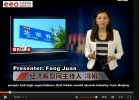

The EO's bilingual podcast is produced every working day and normally goes online at about 5pm in the afternoon. The first 10 or so news items are in Chinese and they are followed by two or three items read in English by the staff of the EO's English department. Click on the player to your left to listen to this episode
1. China's Provinces Elect New Party Committees
Although the 18th national congress of the Communist Party of China (CPC) is not scheduled to be held in the second half of 2012, provinces and autonomous regions around China have been announcing the formation of new provincial committees over recent days. Central communist party committees in four provinces and one autonomous region recently concluded meetings that are held once every five years at which they "voted" on the party leadership for the province. Although over recent days there have been reports that Su Rong (苏荣) has been elected as the new leader of the provincial party committee (省委书记) in Jiangxi (江西) Lu Zhangong (卢展工) in Henan (河南), Zhang Baoshun (张宝顺) in Anhui (安徽) and Yuan Chubqing (袁纯清) chosen as the party head in Shanxi (山西), in fact all these men had earlier been appointed to their position by central party authorities. The same goes for Zhang Chunxian (张春贤) who was "elected" as the leader of the provincial party committee in Xinjiang Uygur Autonomous Region on Oct 31. 2. New Regulations Take Effect From Nov 1, 2011, a series of new economic laws and regulations took effect in China. New regulations about how resource taxes on oil and gas will be collected will come into effect as will changes to the threshold at which value-added tax and sales tax kick in. New regulation that exempt small and very-small enterprises from stamp taxes until Oct 31, 2014 also come into effect. Other regulatory changes include reducing the restrictions on privately run individual businesses and new standards for the design of apartments in Shanghai will also focus on fire protection in the future. 3. NDRC Reduces Price of Aviation Fuel The National Development and Reform Commission (NDRC), will cut ex-factory jet fuel price to 7,277 yuan a ton from 7,501 yuan from today. This is set to benefit airlines as they will be able to buy jet fuel at cheaper prices from the China National Aviation Fuel Group Corp, the country's jet fuel supplier. This is the third times this year that fuel surcharge has been reduced. Airlines are expected to announce reductions in the fuel surcharge that they charge passengers as a result of the move.
财政部、国家税务总局昨天对增值税和营业税的起征点做了调整。调整后,增值税的起征点幅度都提高了,销售货物的增值税的起征点幅度调整为月销售额5000到20000元,而此前为月销售额2000到5000元;销售应税劳务的,增值税起征点的幅度调整为月销售额5000到20000元,此前为月销售额1500到3000元;按次纳税的,提高为每次销售额300到500元,此前为每次销售额150到200元。
营业税方面,按期纳税的,起征点的幅度提高为月营业额5000到20000元,此前为1000到5000元;按次纳税的营业税,提高为每次营业额300到500元,此前为每次营业额100元。
社科院财贸所税收研究室主任张斌表示,起征点范围调整之后,各省将根据自身经济发展水平在范围之内确定本省税率,然后报财政部和税务总局备案。张斌认为,由于本次调整幅度比较大,所有省市都会作出相应调整,并且可能会有很大一部分企业和个体工商户告别增值税和营业税。
2、胡锦涛:推动欧盟承认中国完全市场经济地位
国家主席胡锦涛31日在维也纳同奥地利总统菲舍尔举行会谈。两国元首就双边关系及共同关心的问题深入交换意见,达成重要共识。
胡锦涛在维也纳同奥地利总统菲舍尔会面时表示,希望奥方在推动欧盟承认中国完全市场经济地位和放宽对华高技术出口限制问题上发挥更加积极的作用。奥方回应愿拓展两国经贸合作,共同开发中东欧及亚洲市场。奥方积极支持欧盟承认中国完全市场经济地位。
3、14省份前三季GDP过万亿 28个省市增长超10%
截至10月31日,全国已经有31个省区市公布了2011年前三季度GDP数据。数据显示,14个省市在前三季度GDP就突破万亿元大关,而2009年全年才14个省份GDP突破1万亿元。名列前三甲的广东、江苏、山东更是超过了3万亿元。其中,28个省市GDP前三季度GDP同比增长超10%,仅有浙江、上海、北京三地没过10%。
在年初时,我国提出今年国内生产总值增长8%,物价涨幅控制在4%左右的目标。各省市区也制定了预期目标。如今看来,全国经济增速虽有所回落,但每个季度都远远超过年初8%的增速目标,各省市区GDP增长目标已经超额完成。
4. 上海等四省市试点自行发债 舆论质疑其合法性
当人们还在讨论中国的地方政府会否因为巨额的地方债务而出现危机时,严厉的房地产宏观调控让习惯于以土地、房产税为主要财政收入的地方政府感到了一种从未有过的“生存压力”。
10月20日,财政部发布了《2011年地方政府自行发债试点办法》,规定上海市、浙江省、广东省、深圳市成为地方政府自行发债试点,并指出,债券为记账式固定利率附息债券,期限结构为3年债券发行额和5年债券发行额,分别占国务院批准的发债规模的50%。
中欧国际工商学院经济学与金融学教授许小年直言,地方政府发债是中国财政体制的一项重大变化,未经全国人大审议、批准,立法程序上似有不妥。他认为,地方债的偿还若由中央财政担保,会引发地方政府的“道德风险”,借的冲动强,还的责任弱,埋下债务危机的祸根。
5. 首钢石景山老厂区拆迁 土地创造价值超2000亿
首钢在石景山厂区的钢铁主流程停产后,腾出了一块8.56平方公里的土地。近日首钢党委书记、董事长朱继民日接受访谈时表示,首钢将通过自己控制的企业、参股企业以及从外部引进企业在此发展,预计一年将创造2000亿元产值。
朱继民说,在老厂区不但有首钢自己的企业,也有参股的企业,还有外部企业到这里发展。此前他已表示,首钢在石景山厂区发展的高端装备制造、文化创意等产业,一年将创造1000亿元的产值。朱继民表示,通过外部企业一年将再创造1000亿元产值。也就是说,首钢石景山厂区今后将一年创造出2000亿元的产值。
6. 单品牌服装遭遇盈利天花板 并购成扩张法宝
上半年自意大利老牌服装企业皮尔卡丹放出消息愿意出售品牌之后,国内品牌前赴后继至意大利谈判,目前皮尔卡丹的服装业务由于开价过高,企业还在观望,而其箱包业务已经被广州一家企业购得。
近日,羽绒服生产商波司登也宣布进军女装业务,斥资8.9亿元收购国内女装品牌JESSIE七成股权。波司登正在透过有关收购向女装行业扩展并引入非季节性服装品牌。
以上讯息都表明,现在的服装市场,单品牌难以支撑服装企业的增长,多品牌已成为趋势。自主开发新品牌或者收购品牌成为国内服装企业两大法宝。相对于自主开发品牌耗时耗力,时装大佬们更愿意在品牌收购领域跑马圈地。
7、日本政府干预汇市 日元升值趋势难改
10月31日上午,日本政府联手日本中央银行对外汇市场实行卖出日元、买入美元的外汇干预,导致近期连续更新历史最高水平的日元汇率应声大跌、。日本财务大臣安住淳表示:“现在的日元汇率没有反应日本实体经济,只是投机资金单方面炒作,日本将对其动向将采取坚决措施”。
三菱东京日联银行分析师井野铁兵表示:“目前的日元升值是由于欧美经济减速等外部因素造成,日本政府和中央银行的干预恐怕很难改变日元升值这一趋势。”
从中长期来看,日元的急剧升值将使其经济支柱——汽车和电子器械产业的出口遭受重大打击,相关厂商因利润空间被挤压而不断向海外转移生产基地,这将造成日本产业空洞以及就业问题恶化。日本当局与产业界正在面临一个艰难的选择。
8、“超级马里奥”上任欧洲央行行长
11月1日,原意大利央行行长,马里奥·德拉吉正式接替让·克洛德·特里谢,担任欧洲央行行长,任期8年,到2019年10月31日。德拉吉“临危受命”,将成为引导欧洲走出债务危机的关键人物之一。
债务危机以来,欧洲央行在救助陷入债务危机的国家的过程中发挥了关键作用,但德拉吉的上任人担心,他会更大力度的帮助意大利,从而影响到欧洲央行的独立性。但是分析指出,德拉吉很可能在上任之初更加强硬,手段更加直接,政策更加严苛,以彻底打消人们对意大利人执掌欧洲央行的顾虑。
德拉吉也曾在公开场合表示,反对以债务违约的方式解决希腊债务危机,但可以接受让私人投资者在“自愿”基础上为增援希腊承担一定责任。这基本沿袭了特里谢的立场。
9、China's Provinces Elect New Party Committees
Although the 18th national congress of the Communist Party of China (CPC) is not scheduled to be held in the second half of 2012, provinces and autonomous regions around China have been announcing the formation of new provincial committees over recent days. Central communist party committees in four provinces and one autonomous region recently concluded meetings that are held once every five years at which they "voted" on the party leadership for the province. Although over recent days there have been reports that Su Rong (苏荣) has been elected as the new leader of the provincial party committee (省委书记) in Jiangxi (江西) Lu Zhangong (卢展工) in Henan (河南), Zhang Baoshun (张宝顺) in Anhui (安徽) and Yuan Chubqing (袁纯清) chosen as the party head in Shanxi (山西), in fact all these men had earlier been appointed to their position by central party authorities. The same goes for Zhang Chunxian (张春贤) who was "elected" as the leader of the provincial party committee in Xinjiang Uygur Autonomous Region on Oct 31.
10、New Regulations Take Effect
From Nov 1, 2011, a series of new economic laws and regulations took effect in China. New regulations about how resource taxes on oil and gas will be collected will come into effect as will changes to the threshold at which value-added tax and sales tax kick in. New regulation that exempt small and very-small enterprises from stamp taxes until Oct 31, 2014 also come into effect. Other regulatory changes include reducing the restrictions on privately run individual businesses and new standards for the design of apartments in Shanghai will also focus on fire protection in the future.
11、NDRC Reduces Price of Aviation Fuel
The National Development and Reform Commission (NDRC), will cut ex-factory jet fuel price to 7,277 yuan a ton from 7,501 yuan from today. This is set to benefit airlines as they will be able to buy jet fuel at cheaper prices from the China National Aviation Fuel Group Corp, the country's jet fuel supplier. This is the third times this year that fuel surcharge has been reduced. Airlines are expected to announce reductions in the fuel surcharge that they charge passengers as a result of the move.

